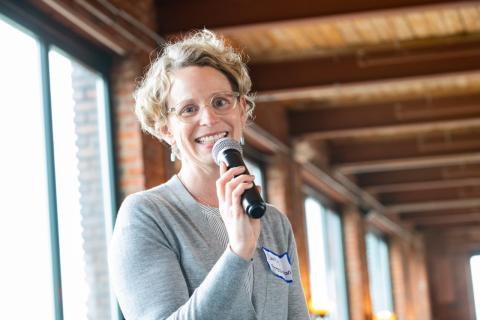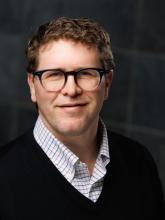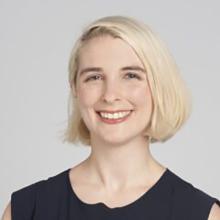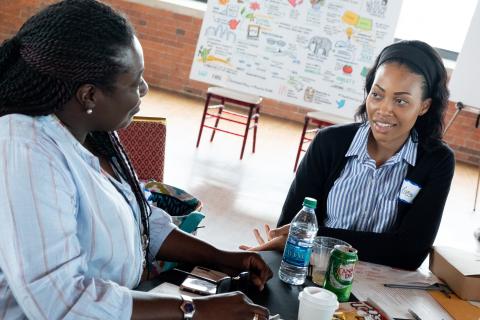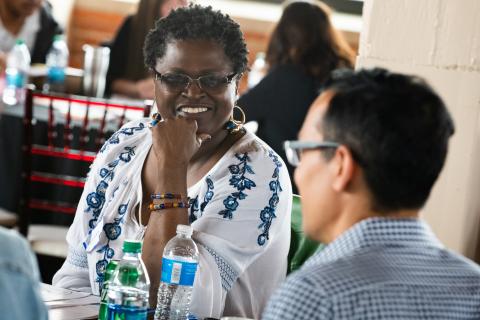Swetland Center connects researchers and community to strive for environmental health equity.
Darcy Freedman, PhD, was nervous as she walked into The Way Station Inc., a community center in East Palestine, Ohio. It was April 10th, 2023—more than a year after a train carrying toxic chemicals had derailed in the small Ohio town.
The environmental crisis attracted international attention and sent its residents reeling. And they had very little in the way of trust to bestow on outsiders like Freedman.
But Freedman, an applied population health scientist and community psychologist by training, forged ahead. As the director of the Mary Ann Swetland Center for Environmental Health at Case Western Reserve University School of Medicine, her goal that night was to connect the community affected by the crisis with the researchers and stakeholders who could help them recover.
Looking out at the room full of concerned citizens, Freedman asked what they needed to begin that recovery process.
“They wanted more research, and they were asking questions: Why didn’t the agencies take blood draws? Why didn’t they do urine samples? Why don’t we have these biomarkers?” said Freedman.
And she had questions of her own: “What are the outcomes you care about? How do we design those studies? How do we connect you with other studies?”
This discussion would help shape re- search on the impact of the toxic tragedy—the perfect example, said Freedman, of integrating the “science of environmental health with community action.”
“But what was clear,” Freedman explained, “is that there was no one institution that could provide all of the support that East Palestine would need to move forward.”
That’s where the Swetland Center would come in.
A forward-thinking founder
Thirty-five years ago, David Swetland established an endowed professorship at the School of Medicine in honor of his late wife, Mary Ann, who had died of breast cancer. Its purpose would be to focus on preventive medicine and environmental health. That professor would also come to lead the Swetland Center which, established in 2003, brings scientists together with community partners to better understand the impact of the environment on human health.
“No one was really thinking about the connection between the environment and human health at that time. It was a very forward-thinking perspective within the field of medicine.”
- Darcy Freedman, PhD, director of the Mary Ann Swetland Center for Environmental Health
Freedman, who became the center’s director in 2019, has increased its annual budget from $250,000 to $2.1 million—a 740% increase.
“I think a lot of our growth was around that space of synergy where we can bring together our expertise and our capacities,” said Freedman. “And we’ve been authentic in our approach, so people want to work with us again. One question leads to another question, or one partnership leads to another partnership.”
Just a few months after the April meeting in East Palestine, Freedman had formed one such partnership: the Ohio/Pennsylvania University Research Consortium. Composed of two dozen researchers from seven universities, responding agencies and members of the East Palestine health community, its goal is to provide accurate, data-driven information that will improve long-term environmental monitoring and public health in East Palestine.
Two researchers in the consortium—School of Medicine genetic epidemiologist and associate professor Fredrick Schumacher, MD (GRS ’03, public health; GRS ’06, epidemiology and biostatistics), and Cleveland Clinic pulmonologist Maeve MacMurdo, MD (GRS ’22, public health)—were among the researchers who were awarded grants from the National Institutes of Health to study the impact of the crisis in East Palestine.
As co-investigators for The Healthy Futures Research Project, Schumacher and MacMurdo have recruited hundreds of East Palestine residents, collecting blood samples, saliva, nails and hair for signs of DNA damage beyond what might be expected during someone’s lifetime.
“We are looking for novel approaches to change the paradigm and identify diseases like cancer early on,” Schumacher said. “We will be able to expand our research and show the people of East Palestine that we are here to help.”
“Understanding the possible long-term health impacts of the train derailment,” said MacMurdo, “is an important first step in giving residents the information they need about the link between exposure and health outcomes.”
Future moves
East Palestine is just one of many projects the Swetland Center has taken on in recent years. In the near future, Freedman will lead the center through other initiatives in areas such as food systems, environmental justice and community-level translational science. Next year, she’ll oversee the relocation of the center to a new home in the Cleveland Foundation’s Midtown Collaboration Center, a mixed-use community center with plenty of space to host conversations like those held in East Palestine.
“The Swetland Center excels at organizing the necessary expertise and resources to address environmental issues that affect human health, such as the situation in East Palestine,” said Ruth Eppig, president of the Sears-Swetland Family Foundation and granddaughter of founder, David Swetland. “Leveraging its ability to work within and across Case Western Reserve University, partner with other academic institutions and en- gage with the community, the center is committed to bringing the best translational science to aid in East Palestine’s rebuilding efforts.”
In July, Freedman’s consortium returned to East Palestine—this time meeting at the high school gym— where they shared findings about soil and sediment analysis with residents and brainstormed ideas for future research. The Swetland Center’s convening role in the crisis will continue to support translation of new study findings for community benefit.
“There’s no way we can recycle our way out of the problems that we see in the world,” said Freedman. “We’re talking about wholesale change of communities.” And in order to make progress toward change, she explained, they must start with building trust.
“We have to see where we can find agreement to move forward on a common shared agenda around environmental health equity.”
- Darcy Freedman, PhD, director of the Mary Ann Swetland Center for Environmental Health


